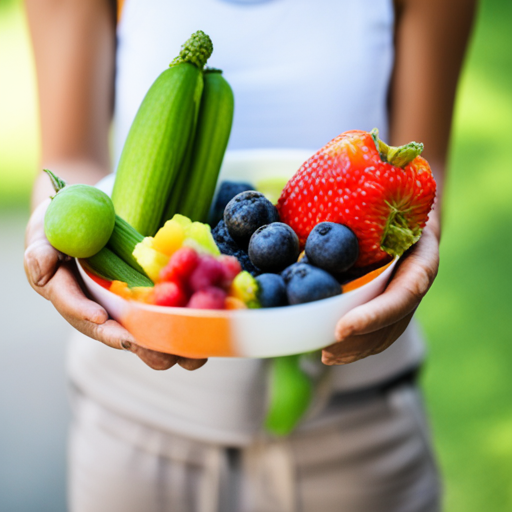
Are you an athlete looking to enhance your performance and speed up recovery? Fueling your body with the right foods is key, and one important aspect to consider is incorporating anti-inflammatory foods into your diet. Inflammation is a natural response to exercise, but chronic inflammation can hinder athletic performance and increase the risk of injuries. By consuming foods that reduce inflammation, athletes can optimize their performance and support overall health. In this blog post, we will explore the top anti-inflammatory foods that can benefit athletes and help them reach their full potential.
The Impact of Inflammation on Athletic Performance
Before diving into the specific foods, it’s important to understand the impact of inflammation on athletic performance. When you engage in intense physical activity, such as endurance training or high-intensity workouts, your muscles experience micro-tears. This triggers an inflammatory response as your body works to repair the damaged tissues. While acute inflammation is essential for the healing process, chronic inflammation can have detrimental effects.
The Dangers of Chronic Inflammation
Chronic inflammation can lead to persistent pain, delayed recovery, decreased muscle strength, and increased risk of injuries. It can also hinder muscle growth and impair immune function. Athletes who regularly push their bodies to the limit are particularly susceptible to chronic inflammation, as their training often involves repetitive stress on the muscles and joints.
How Anti-Inflammatory Foods Help
Anti-inflammatory foods contain compounds that combat inflammation and support the body’s natural healing process. These foods can help reduce the risk of chronic inflammation and promote faster recovery, allowing athletes to train harder and perform better. Including a variety of anti-inflammatory foods in your diet can provide the necessary nutrients to support optimal athletic performance.
Next, let’s explore some of the top anti-inflammatory foods that athletes should consider incorporating into their diet.
Top Anti-Inflammatory Foods for Athletes
1. Fatty Fish
Fatty fish, such as salmon, mackerel, and sardines, are rich in omega-3 fatty acids. These fatty acids have potent anti-inflammatory properties and can help reduce inflammation in the body. They also support heart health and improve cognitive function, which are crucial for athletic performance. Aim to consume fatty fish at least twice a week to reap the benefits.
2. Berries
Berries, including blueberries, strawberries, and raspberries, are packed with antioxidants that combat inflammation. These colorful fruits are also high in fiber, which aids digestion and supports overall gut health. Incorporating a variety of berries into your diet can provide a wide range of beneficial compounds that promote recovery and reduce inflammation.
3. Leafy Green Vegetables
Leafy green vegetables, such as spinach, kale, and Swiss chard, are excellent sources of vitamins, minerals, and antioxidants. They also contain flavonoids, which have anti-inflammatory effects. Adding leafy greens to your meals can help reduce inflammation and provide essential nutrients for optimal athletic performance.
4. Turmeric
Turmeric is a spice that contains the active compound curcumin, known for its powerful anti-inflammatory properties. Incorporating turmeric into your diet, either as a spice or in supplement form, can help reduce inflammation and support overall health. Pairing turmeric with black pepper can enhance its absorption in the body.
5. Tart Cherries
Tart cherries are a rich source of antioxidants and have been shown to reduce inflammation and muscle soreness. Consuming tart cherry juice or incorporating dried or frozen tart cherries into your diet can help accelerate recovery and improve athletic performance.
6. Nuts and Seeds
Nuts and seeds, such as almonds, walnuts, and flaxseeds, are packed with healthy fats and antioxidants. They also contain fiber and other beneficial compounds that promote anti-inflammatory effects. Including a variety of nuts and seeds in your diet can provide essential nutrients and support muscle recovery.
7. Olive Oil
Olive oil is rich in monounsaturated fats and contains a compound called oleocanthal, which has anti-inflammatory properties similar to ibuprofen. Drizzling olive oil over salads or using it for cooking can help reduce inflammation and support overall health.
8. Ginger
Ginger has been used for centuries as a natural remedy for inflammation. It contains compounds called gingerols, which have anti-inflammatory effects. Adding fresh ginger to your meals or drinking ginger tea can help reduce inflammation and support recovery.
Conclusion
Incorporating anti-inflammatory foods into your diet is an effective strategy for athletes looking to optimize their performance and support faster recovery. By reducing inflammation, athletes can minimize the risk of chronic injuries and enhance their overall well-being. Remember to include a variety of these foods in your meals to maximize their benefits. Additionally, it’s important to consult with a healthcare professional or registered dietitian to create a personalized nutrition plan that suits your specific needs and training goals.
Boost your performance by fueling your body with the right foods – your athletic journey awaits!
The Impact of Inflammation on Athletic Performance
In this section, we will explore the impact of inflammation on athletic performance and the dangers of chronic inflammation.
How Anti-Inflammatory Foods Help
In this section, we will discuss how anti-inflammatory foods can help reduce chronic inflammation and support optimal athletic performance.
Top Anti-Inflammatory Foods for Athletes
In this section, we will dive into the top anti-inflammatory foods that athletes should consider incorporating into their diet.
Conclusion
In this final section, we will summarize the main points of the post and provide a concrete action plan on how athletes can incorporate anti-inflammatory foods into their diet to boost their performance.
Conclusion
In conclusion, incorporating anti-inflammatory foods into an athlete’s diet can have significant benefits on their performance and recovery. By reducing chronic inflammation, athletes can optimize their training and minimize the risk of injuries. It is crucial for athletes to prioritize their nutrition and consult with professionals to create personalized meal plans. By fueling their bodies with the right foods, athletes can take their performance to the next level and achieve their goals.